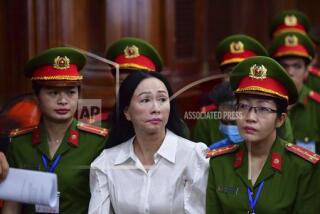Justice in the Killing Fields
- Share via
The killing fields outside Phnom Penh are a ghastly tourist attraction now, as is the school-turned-jail where the Khmer Rouge tortured and executed those it disliked or distrusted. Yet more than 20 years after the end of the Cambodian reign of terror, the men who gave the orders for the killing have not been brought to trial. That should change, and soon.
Last week Cambodian King Norodom Sihanouk signed a law to create a genocide tribunal to try former Khmer Rouge leaders. That’s an important start to bringing people into the dock, but Cambodia needs to accept help from foreign prosecutors and judges, under the aegis of the United Nations.
The country’s lack of infrastructure extends to its feeble court system, renowned for corruption and willingness to bow to the dictates of Prime Minister Hun Sen and his ruling Cambodian People’s Party.
Hun Sen himself is a former Khmer Rouge. He fled to Vietnam when he was marked for execution and returned with Vietnamese help to drive Pol Pot and his fellow killers from power in 1979.
Pol Pot died in 1998, but other top leaders remain at large in the country, including the former foreign minister, Ieng Sary, and the former head of state, Khieu Samphan. The only two top-level Khmer Rouge in custody are military leader Ta Mok and Kaing Khek Iev, known as Duch. Duch was the jailer at Tuol Sleng, the former high school where at least 14,000 people were killed.
When the Khmer Rouge seized power in April 1975, two weeks before the Communist conquest of neighboring Vietnam, they emptied the cities and began the slaughter of the educated, the military and those who served the previous, non-Communist, regime. An estimated 1 million were killed outright; another 1 million died from disease and starvation.
Last month the War Crimes Research Office of the law school of American University and the Coalition for International Justice released a report naming seven living Khmer Rouge leaders believed to have planned killings. Ta Mok is one of them. Duch (a nom de guerre) is not, though the report includes his admission that even before the party seized power it decided to execute party members whom it considered traitors to “rid our ranks of the enemy.” That report, based on documents compiled in Phnom Penh, is a valuable guide for prosecutors. Duch’s testimony would be important as well.
The killers have been allowed to wander Cambodia largely unimpeded for far too long. They need to be made to answer for their terrible crimes, so Cambodians can build a stronger nation based on justice.
More to Read
Sign up for Essential California
The most important California stories and recommendations in your inbox every morning.
You may occasionally receive promotional content from the Los Angeles Times.













